 Photo: John Berryman
Photo: John BerrymanWell, I hate to see Thanksgiving vacation end. It has been a restful few days. There are actually just three weeks of classes left, including final exam week, so we are racing to the wire. And then another break, during which I need to apply for a couple of grants and do my preparation for next semester's classes.
John Berryman's life and work have been preoccupations of mine lately. I plan to discuss him in the seminar next semester. As I read about him, I find he is far more interesting to me than I expected he would be. Berryman was intelligent, a teacher and a scholar as well as a poet. He published essays on Shakespeare, which I plan to read over break. Looking at samples of them on Amazon, I saw that he brings a poet's sensibility to Shakespeare. I look forward to reading them. I also ordered a used copy of his letters to his mother (no longer in print). I've seen excerpts and they look fascinating.
Berryman articulated his ideas plainly about what writing meant to him, and it is clear to me that he equated writing with life itself, with his survival. That he did commit suicide in his 60's is regrettable, however not a contradiction, I think. Some people have said he "paid a price" for writing so close to the bone and soul of his existence; rather, I would say it was his writing that kept him alive for so many years (he had also attempted suicide very early in his life).
Berryman's wife, in her book Poets in Their Youth, explains: "It was the poetry that kept him alive... his certainty that there were all those poems still be be written." Always, Berryman was searching for a way to express his "unsayable centre."
Berryman, like John Gardner (author of Grendel), whom I've written about in my blog before because he was so smart and so wild and so authentic, and because taught me everything about writing when I was first beginning, believed that a writer was helped by a psychic wound, a tragic experience that has helped shape the writer's consciousness.
Berryman's psychic wound was the suicide of his father (Berryman found the body). Berryman was named after his father. His birth name was John Allyn Smith, Jr. After his father's suicide, Berryman's mother married her lover, John Allyn McAlpin Berryman and changed her son's name to Berryman. As a result of these experiences, John Berryman the poet would have a lifelong obsession with the idea of identity.
Berryman wrote essays, in addition to poetry, on many subjects, including Stephen Crane and even Anne Frank.
Berryman believed that "the mistress of [Crane's] mind was fear [of abandonment, uncertainty, death]." This statement is important because Berryman believed that writing is a ritual that helps to dispel fear of the unexplainable and the uncertain. He believed that the ritual of writing has power to objectify experience. Through writing poetry, Berryman was able to dispel his own fears and disappoinments.
He also believed that through the ritual of writing, Anne Frank was able to dispel her own fears and create not just a diary but a work of art. He thought that when certain pressures are exerted on writers, their work is elevated to a new, higher level. This is why Frank's diary is more than just adolescent ramblings. Berryman said in his essay "The Development of Anne Frank": "It took...a special pressure forcing [her] child-adult conversion, and exceptional self-awareness and exceptional candour and exceptional powers of expression, to bring that...change into view."
This observation goes along with what Louise DeSalvo says in her book, Writing as a Way of Healing. She says that certain pressures can create a sense of new clarity in our writing.
As Charles Thornbury says, Berryman believed the function of a poem is, in Berryman's own words, "to seize an object and make it visible."
Thornbury says, "The use of ritual--this act of making something visible and thus objectifying it--and what it does for the poet (and the reader) gradually became [Berryman's] fundamental principle."
Berryman also believed that poetry "aims ... at the reformation of the poet." He equates poetry to prayer in this fascinating passage:
"Poetry is a terminal activity, taking place out near the end of things, where the poet's soul addresses one other soul only, never mind when. And it aims--never mind either communication or expression--at the reformation of the poet, as prayer does. In grand cases--as in our century, yeats and Eliot--it enables the poet gradually, again and again, to become almost another man; but something of that sort happens, on a small scale, a freeing, with the creation of every real poem."
With all that said, I'd like to share one of my favorite Berryman poems. It is about, of all things, boredom. I have often wondered whether writing this poem helped to lift Berryman out of his boredom, whether writing this poem was "freeing." We can't know. But I love the poem because it shows me that even great writers like Berryman sometimes feel like hanging it all up and quitting.
John Berryman
Dream Song 14
Life, friends, is boring. We must not say so.
After all, the sky flashes, the great sea yearns,
we ourselves flash and yearn,
and moreover my mother told me as a boy
(repeatingly) "Ever to confess you're bored
means you have no
Inner Resources." I conclude now I have no
inner resources, because I am heavy bored.
Peoples bore me,
literature bores me, especially great literature,
Henry bores me, with his plights & gripes
as bad as Achilles,
who loves people and valiant art, which bores me.
And the tranquil hills, & gin, look like a drag
and somehow a dog
has taken itself & its tail considerably away
into the mountains or sea or sky, leaving
behind: me, wag.
John Berryman's life and work have been preoccupations of mine lately. I plan to discuss him in the seminar next semester. As I read about him, I find he is far more interesting to me than I expected he would be. Berryman was intelligent, a teacher and a scholar as well as a poet. He published essays on Shakespeare, which I plan to read over break. Looking at samples of them on Amazon, I saw that he brings a poet's sensibility to Shakespeare. I look forward to reading them. I also ordered a used copy of his letters to his mother (no longer in print). I've seen excerpts and they look fascinating.
Berryman articulated his ideas plainly about what writing meant to him, and it is clear to me that he equated writing with life itself, with his survival. That he did commit suicide in his 60's is regrettable, however not a contradiction, I think. Some people have said he "paid a price" for writing so close to the bone and soul of his existence; rather, I would say it was his writing that kept him alive for so many years (he had also attempted suicide very early in his life).
Berryman's wife, in her book Poets in Their Youth, explains: "It was the poetry that kept him alive... his certainty that there were all those poems still be be written." Always, Berryman was searching for a way to express his "unsayable centre."
Berryman, like John Gardner (author of Grendel), whom I've written about in my blog before because he was so smart and so wild and so authentic, and because taught me everything about writing when I was first beginning, believed that a writer was helped by a psychic wound, a tragic experience that has helped shape the writer's consciousness.
Berryman's psychic wound was the suicide of his father (Berryman found the body). Berryman was named after his father. His birth name was John Allyn Smith, Jr. After his father's suicide, Berryman's mother married her lover, John Allyn McAlpin Berryman and changed her son's name to Berryman. As a result of these experiences, John Berryman the poet would have a lifelong obsession with the idea of identity.
Berryman wrote essays, in addition to poetry, on many subjects, including Stephen Crane and even Anne Frank.
Berryman believed that "the mistress of [Crane's] mind was fear [of abandonment, uncertainty, death]." This statement is important because Berryman believed that writing is a ritual that helps to dispel fear of the unexplainable and the uncertain. He believed that the ritual of writing has power to objectify experience. Through writing poetry, Berryman was able to dispel his own fears and disappoinments.
He also believed that through the ritual of writing, Anne Frank was able to dispel her own fears and create not just a diary but a work of art. He thought that when certain pressures are exerted on writers, their work is elevated to a new, higher level. This is why Frank's diary is more than just adolescent ramblings. Berryman said in his essay "The Development of Anne Frank": "It took...a special pressure forcing [her] child-adult conversion, and exceptional self-awareness and exceptional candour and exceptional powers of expression, to bring that...change into view."
This observation goes along with what Louise DeSalvo says in her book, Writing as a Way of Healing. She says that certain pressures can create a sense of new clarity in our writing.
As Charles Thornbury says, Berryman believed the function of a poem is, in Berryman's own words, "to seize an object and make it visible."
Thornbury says, "The use of ritual--this act of making something visible and thus objectifying it--and what it does for the poet (and the reader) gradually became [Berryman's] fundamental principle."
Berryman also believed that poetry "aims ... at the reformation of the poet." He equates poetry to prayer in this fascinating passage:
"Poetry is a terminal activity, taking place out near the end of things, where the poet's soul addresses one other soul only, never mind when. And it aims--never mind either communication or expression--at the reformation of the poet, as prayer does. In grand cases--as in our century, yeats and Eliot--it enables the poet gradually, again and again, to become almost another man; but something of that sort happens, on a small scale, a freeing, with the creation of every real poem."
With all that said, I'd like to share one of my favorite Berryman poems. It is about, of all things, boredom. I have often wondered whether writing this poem helped to lift Berryman out of his boredom, whether writing this poem was "freeing." We can't know. But I love the poem because it shows me that even great writers like Berryman sometimes feel like hanging it all up and quitting.
John Berryman
Dream Song 14
Life, friends, is boring. We must not say so.
After all, the sky flashes, the great sea yearns,
we ourselves flash and yearn,
and moreover my mother told me as a boy
(repeatingly) "Ever to confess you're bored
means you have no
Inner Resources." I conclude now I have no
inner resources, because I am heavy bored.
Peoples bore me,
literature bores me, especially great literature,
Henry bores me, with his plights & gripes
as bad as Achilles,
who loves people and valiant art, which bores me.
And the tranquil hills, & gin, look like a drag
and somehow a dog
has taken itself & its tail considerably away
into the mountains or sea or sky, leaving
behind: me, wag.



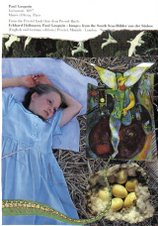


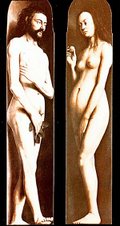

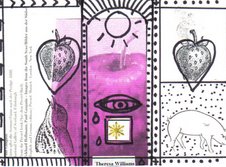
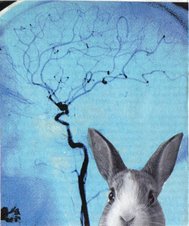
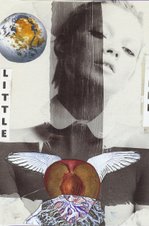
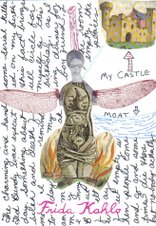
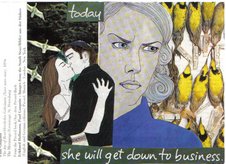

4 comments:
Well, I can just see I'd better hurry and ready Berryman. I had no idea. Thank you for the illumination!
I've never read any Berryman and know that has to change. By the way, I love what you did with your sidebar. Adding your collages, the excerpt from your novel -- beautiful.
Dear Theresa,
Hello! You've inspired me to go read some Berryman, and also perhaps to go back and re-read THE DIARY OF ANNE FRANK (I haven't read it since jr. high school). I'm very interested to hear more about your new course as it goes along. I envy the students who will get to enjoy it!
Hope all is well,
Love,
Erin
Where did you obtain the excerpt where Berryman equates poetry to a prayer through language? It is something I have been attempting to find, but I have forgotten the source my instructor mentioned.
I can be reached at: icymoonflames@yahoo.com
Thank you very much.
Post a Comment